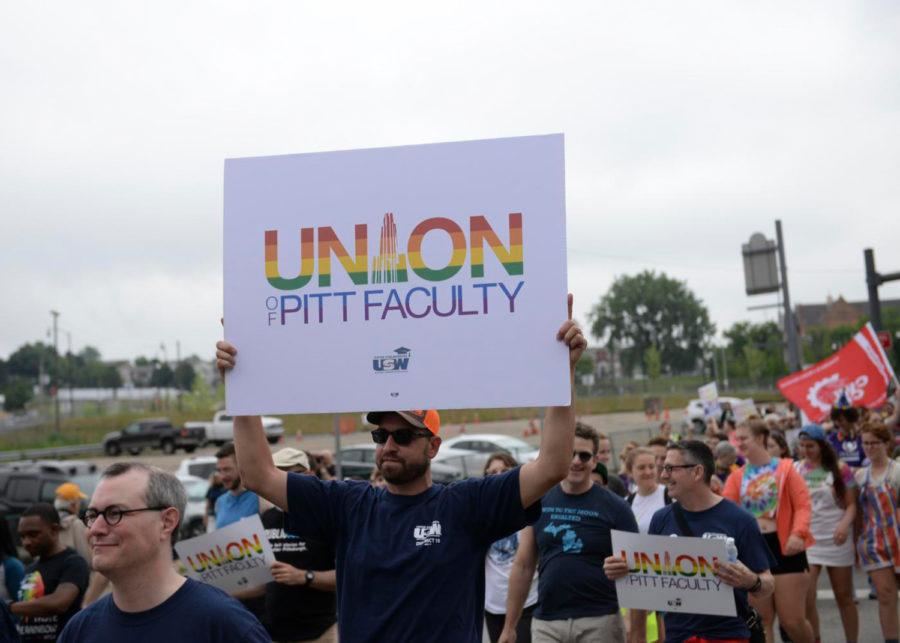Faculty union organizers appeal PLRB decision
University of Pittsburgh faculty unionizers at the People’s Pride parade in June 2018.
April 25, 2019
A years-long effort to unionize more than 3,500 Pitt faculty appeared to have failed last Wednesday when the Pennsylvania Labor Relations Board, or PLRB, ruled that organizers failed to collect enough signed authorization cards from eligible faculty to prompt a union election.
But organizers at Pitt and the United Steelworkers, the union aiding Pitt’s faculty unionization attempt, filed an appeal Thursday afternoon with the PLRB. In it, organizers requested to see the list of faculty eligible to vote on unionization that the university had given the PLRB, challenging the PLRB’s assertion that less than the required 30% of Pitt’s faculty had signed cards.
USW claimed in a Thursday press release that Pitt had deliberately inflated the bargaining unit to derail unionization efforts.
“The Pitt Faculty Organizing Committee … believes the University of Pittsburgh administration deliberately inflated the number of University instructors in their potential bargaining unit in an attempt to avoid a union election,” the statement read.
When organizers began collecting signed authorization cards in January 2018, Tyler McAndrew, a prominent organizer and visiting lecturer in the English department, said they estimated the number of faculty on the list based on statistics published in the University factbook. McAndrew said as of 2019 the University factbook lists around 2,500 to 2,600 faculty who are eligible to be in the union.
[Read: Pitt faculty see future in union]
“If we’re going off the number [of faculty] in the factbook, we had a pretty good pillow … significantly more than the 30% of cards we needed,” McAndrew said.
USW organizer and researcher Robin Sowards said organizers operated under the assumption that the unit included at least 1,000 more faculty than the university had published in the factbook, For one, Pitt could include what it calls “temporary-part time faculty” in the list, an arbitrary categorization according to Sowards, and a group of faculty who are excluded from the faculty count in the University factbook.
“For this reason, we knew the factbook provided an underestimate,” Sowards said. “There are people the University classifies as ‘temporary part-time faculty’ who certainly deserve to be in the bargaining unit … we just didn’t realize quite how much [Pitt] inflated [the list].”
Sowards said the University likely also has several hundred professors on the books who stopped teaching several years ago.
“I went on find.pitt.edu, where you can look up University faculty, and the website listed a professor who had died in the year 2000,” Sowards said. “It’s not a matter of organizers not accounting for [some faculty], it’s a matter of [the University] including faculty who don’t belong in the unit.”
McAndrew said between the numbers listed in the factbook and the PLRB’s decision to put up a “brick wall” against the faculty union election, he believes the University manipulated the list.
“Either the administration is lying in that factbook, or they’re lying to the PLRB or they’ve somehow hired several hundred faculty in the past 6 months, which seems incredibly unlikely,” McAndrew said. “Either way they’re lying to faculty.”
But University spokesperson Joe Miksch firmly denied the allegation.
“The United Steelworkers’ claim — that the faculty count submitted to the PLRB was deliberately inflated — is false,” Miksch said. “This list was pulled from school records and, per the United Steelworkers’ petition, it included all full-time and part-time faculty members and librarians.”
This isn’t the first time organizers and Pitt’s administration have debated the size of the bargaining unit. In an early March conference call between organizers, USW lawyers, PLRB agents and University representatives, the administration raised several complaints with organizers’ proposed bargaining unit — it wanted to include the medical school, effectively doubling the size of the unit, and exclude department chairs due to their “supervisory status.”
[Read: Faculty braces for Pitt’s union “stalling tactics”]
Miksch said the University’s list submitted to the PLRB did not include faculty members from the School of Medicine.
Caroline Brickman, a union organizer and adjunct English professor who was on the call, said the PLRB agreed to defer a decision on the size of the bargaining unit to a later date, and subsequently scheduled hearings for July to debate that very issue.
“It’s very frustrating that our petition has now been rejected even though we’ve never had the chance to even debate who’s in the bargaining unit,” Brickman said. “[The PLRB] has given the administration full control over who they put in that list … and the administration, it seems, doesn’t have our best interests at heart.”
Still, organizers maintain that the ruling is only a minor setback, and said they anticipated “obstruction” from the University.
“Worst-case scenario, this delays the vote by a year,” Brickman said. “If we have to go back to square one and [have to] start signing authorization cards again, we already have our support-base in place.”
Many organizers, including Brickman, believe the appeal will be successful — though the PLRB could take up to six months to make a decision.
“We’re holding our breaths, but I think we played our cards right from day one,” Brickman said. “This is just another hurdle we have to jump.”



